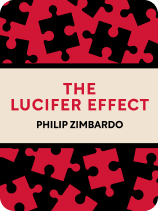

This article is an excerpt from the Shortform book guide to "The Lucifer Effect" by Philip Zimbardo. Shortform has the world's best summaries and analyses of books you should be reading.
Like this article? Sign up for a free trial here .
Are you looking for The Lucifer Effect quotes? What does Philip Zimbardo have to say about the Stanford Prison Experiment?
In The Lucifer Effect, Philip Zimbardo, the psychologist famous for running the notorious Stanford Prison Experiment, argues that most of us drastically misunderstand human evil. This misunderstanding causes many unsuspecting people to willingly participate in evil and abuse.
Here are the best quotes from The Lucifer Effect with explanations.
The Lucifer Effect Quotes
The Lucifer Effect was written by Philip Zimbardo, the psychologist famous for running the notorious 1971 Stanford Prison Experiment, in which undergraduate students acted as prisoners and guards in a mock prison and quickly lost themselves in their roles. He published the book in 2007, intending it to be a retrospective of everything he learned from the experiment. In it, Zimbardo argues that most of us drastically misunderstand evil: We underestimate the potential for the circumstances of a given time and place to transform ordinary people into heartless killers.
Here are the top The Lucifer Effect quotes.
“The most dramatic instances of directed behavior change and “mind control” are not the consequence of exotic forms of influence, such as hypnosis, psychotropic drugs, or “brainwashing,” but rather the systematic manipulation of the most mundane aspects of human nature over time in confining settings.”
In 1971, Zimbardo turned the basement of Stanford University’s psychology building into a simulated prison, paying undergraduate male volunteers to act as prisoners and guards. Decades later, psychologists still discuss the Stanford Prison Experiment because of its shocking findings of human nature and the unethical treatment of its test subjects.
While he planned to run the experiment for two weeks, Zimbardo ended it after just six days because his “prisoners” were suffering far more than he intended, largely due to their guards’ extreme abusive behavior. For example, the guards refused to let the prisoners sleep, constantly harassed them with insults and arbitrary demands, and punished them by making them exercise until they dropped.
“Before I knew that a man could kill a man, because it happens all the time. Now I know that even the person with whom you’ve shared food, or whom you’ve slept, even he can kill you with no trouble.”
Zimbardo defines evil as any intentional harm done to innocent people. Most people assume that if someone does something truly evil—on the level of murder, torture, or rape—there must be something uniquely twisted about them. They’re an “evil person,” and it would be difficult or impossible to rehabilitate them. (We’ll call this the “theory of fixed morals,” as it implies that each individual’s moral compass is relatively fixed and slow or impossible to change.)
Zimbardo offers an opposing theory: He argues that any one of us could commit the worst evil imaginable if we found ourselves in the wrong situation. (We’ll call this the “theory of circumstantial morals” because it implies that each individual’s moral compass can change rapidly in response to new circumstances.)
In other words, Zimbardo argues that evildoers are ordinary people who find themselves in situations that cause them to disengage their normal sense of morality. Interviews have confirmed that many people who do great evil—terrorists, torturers, those who facilitate genocide—are otherwise psychologically healthy and rational. They’re just like any of us.
“A good way to avoid crimes of obedience is to assert one’s personal authority and always take full responsibility for one’s actions.”
Zimbardo explains that most people have a self-serving bias—we understand how circumstances impact human behavior, but we assume that we’re too clever and self-aware to make the same mistakes. Overconfidence leaves us vulnerable to circumstantial influence—instead, tighten your morals more than you feel is necessary to prevent yourself from unwittingly doing evil.
One way Zimbardo suggests doing this is by taking full responsibility for your actions. Never blame someone else for making you do something—for example, if a friend were to convince you to help them rob a convenience store, or if your boss told you to hide the evidence of their embezzlement, you should view these misdeeds as if you did them alone. This habit will help you think twice before social pressures influence you to become complicit in someone else’s evil.
“Bad systems” create “bad situations” create “bad apples” create “bad behaviors,” even in good people.”
If the people who do evil are largely at the mercy of circumstances outside of their control, who is ultimately to blame for the evil in the world? Zimbardo argues that we should blame the institutions in power that establish specific circumstances. In his eyes, to effectively curb evil, we have to change the systems that give rise to the situations that encourage it.
According to Zimbardo, these institutions gain power by influencing enough people to accept their ideology—a belief system centered around the highest value that must be achieved by any means necessary. These institutions attempt to perpetuate their ideology and stay in power by relentlessly pursuing their highest value, creating the circumstances conducive to great evil in the process.

———End of Preview———
Like what you just read? Read the rest of the world's best book summary and analysis of Philip Zimbardo's "The Lucifer Effect" at Shortform .
Here's what you'll find in our full The Lucifer Effect summary :
- How ordinary people can turn into heartless killers
- Insights and criticisms of the Stanford Prison Experiment
- Tips on how to resist circumstantial influences






